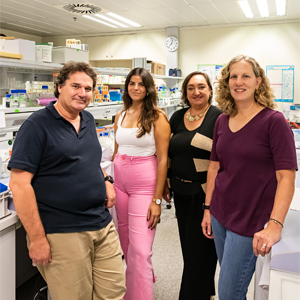Lettuce and broccoli more resistant to drought
A team from the UPV, the CSIC, the UJI and Caldic Ibérica has developed a product based on four natural extracts that stimulates the defences of both crops in conditions of drought and salinity.
[ 14/10/2024 ]
A team from the Universitat Politècnica de València (UPV), the Spanish National Research Council (CSIC) and the Universitat Jaume I of Castelló, in collaboration with the company Caldic Ibérica, has developed a product based on four natural extracts from different plants and algae that stimulates the resistance of lettuce to salinity and drought, a growing problem in Mediterranean agriculture.
The study, led by the Institute of Molecular and Cellular Biology of Plants (IBMCP), a joint centre of the UPV and the CSIC, and recently published in the Journal of Integrative Plant Biology, points out that the product, called CalBio, can be used in both conventional and organic farming, as it does not contain synthetic chemical products and therefore complies with the regulations.
Increases lettuce yields
Research shows that the application of this product (solid and granular particles) in the irrigation system increases the yield of the lettuce crop under normal conditions, but especially on saline soils. The substance applied to the plant induces the production of plant hormones called "cytokinins", which cause the plant to increase its defences in agricultural soils with high salinity.
Product considered a biostimulant
José Miguel Mulet, IBMCP researcher and coordinator of the study, points out that "since these are products of natural origin, the approval process is easier because they are considered biostimulants, so the transfer of these results to farmers will be much quicker and easier. In addition, the efficacy of CalBio is proven and its molecular mechanism is known, which is not the case with many products currently on the market. We have also found that the product is most effective when used in combination with micro-organisms that occur naturally in plant roots. These are bacteria from the PGPB family, plant growth promoting bacteria. These micro-organisms live in the soil and form a symbiosis with plant roots. The study shows that the bacteria belong to the Bacillus megaterium strain", explains Mulet.
The research is the result of a project from the 2022 Call for Collaborative Challenges of the Ministry of Science, Innovation and Universities (Next Generation), with the company Caldic Ibérica, a wholesaler of chemical products for industry, food and pharmaceuticals. Vicente Arbona and Miguel González-Guzmán, professors at the Universitat Jaume I in Castelló, are also involved in the project.
It also works on broccoli and is being evaluated in other crops
The team of scientists has also confirmed that the product, made from natural plant and algae extracts, also works on broccoli, in a study just published in the journal Scientia horticulturae. What is unique about this experiment is that the product is effective without the cooperation of PGPB bacteria, as broccoli and all Brassica vegetables do not normally form a symbiosis in the roots.
They are also evaluating its performance on tomato, avocado, onion, pepper and aubergine. All field trials are being carried out at AVA-ASAJA's experimental plot in Polinyà del Xúquer (Valencia).
References
Patricia Benito, Marina Celdrán, Javier Bellón, Vicente Arbona, Miguel González?Guzmán, Rosa Porcel, Lynne Yenush and José M. Mulet. The combination of a microbial and a non-microbial biostimulant increases yield in lettuce (Lactuca sativa) under salt stress conditions by up-regulating cytokinin biosynthesis[J]. J Integr Plant Biol., DOI: 10.1111/jipb.13755.
Carlos Montesinos, Patricia Benito, Rosa Porcel, Javier Bellón, Miguel González-Guzmán, Vicent Arbona, Lynne Yenush, José M. Mulet. Field evaluation and characterization of a novel biostimulant for broccoli (Brassica oleracea var. italica) cultivation under drought and salt stress which increases antioxidant, glucosinolate and phytohormone content. Scientia Horticulturae, 2024. DOI: https://doi.org/10.1016/j.scienta.2024.113584.
Outstanding news
 The Diamond Army
The Diamond Army
Two students came up with the UPV initiative that has engaged more than 1,600 volunteers and shattered the false myth of the 'crystal generation'
 ARWU 2024
ARWU 2024
The Shanghai ranking reaffirms the UPV as the best polytechnic in Spain for yet another year
 Distinction of the Generalitat for Scientific Merit
Distinction of the Generalitat for Scientific Merit
Guanter has been distinguished in recognition of his research excellence in the development of satellite methods for environmental applications
 The new statutes come into force
The new statutes come into force
The Universitat Politècnica de València is the first university in Spain with statutes adapted to the new LOSU
 NanoNIR project against breast cancer
NanoNIR project against breast cancer
UPV Researcher Carla Arnau del Valle receives an EU Marie Curie grant to develop biosensors for the early detection of this cancer
 Large artificial intelligence language models, increasingly unreliable
Large artificial intelligence language models, increasingly unreliable
According to a study by the Universitat Politècnica de València, ValgrAI and the University of Cambridge, published in the journal Nature





